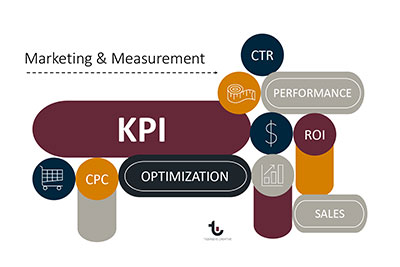Measuring Success: Key Performance Indicators (KPIs) for Marketing Excellence
A Marketing Measurement Plan is a structured approach to collecting and analyzing data to evaluate the performance of marketing efforts against set objectives. It enables businesses and marketers to understand the effectiveness of their marketing campaigns, adjust strategies in real-time, and optimize return on investment (ROI). One key element is Key Performance Indicators (KPIs).
Key Performance Indicators for Marketing
KPIs can vary depending on your specific marketing goals and strategies. However, here are some common marketing Key Performance Indicators to consider tracking:
Website Traffic and Engagement
Google Analytics is a free tool your business can use to get started.
-
- Website Traffic: Monitor the total number of visitors to your website.
- Unique Visitors: Track the number of distinct individuals visiting your website.
- Pageviews: Measure how many pages users view on average per session.
- Bounce Rate: Assess the percentage of visitors who leave the site after viewing only one page.
- Average Session Duration: Measure the average time visitors spend on your website.
Lead Generation and Conversion
-
- Conversion Rate: Measure the percentage of website visitors who take a desired action (e.g., filling out a contact form, making a purchase).
- Cost Per Conversion (CPC): Calculate the cost of acquiring a lead or customer.
- Click-Through Rate (CTR): Assess the effectiveness of ad campaigns or email marketing.
- Marketing Qualified Leads (MQLs): Track the number of leads that meet your marketing criteria.
- Sales Qualified Leads (SQLs): Measure leads that meet your sales criteria.
Social Media Engagement
Yes, you can simply use platform analytics offered by Facebook, Instagram, Youtube or LinkedIn. However, leveraging social media analytics tools like Hootsuite or SproutSocial will provide you with deeper, consolidated data across social platforms.
-
- Follower Growth: Monitor the increase in social media followers.
- Engagement Rate: Measure the interaction with your social media posts (likes, shares, comments).
- Click-Through Rate (CTR): Evaluate the effectiveness of links in social media posts.
- Social Shares: Track how often your social media content is shared.
- Influencer Impact: Measure the impact of influencer collaborations.
Email Marketing
-
- Open Rate: Measure the percentage of email recipients who open your emails.
- Click-Through Rate (CTR): Assess how many recipients click on links within your emails.
- Conversion Rate: Measure the percentage of email recipients who complete a desired action.
- Bounce Rate: Track the percentage of emails that were not delivered successfully.
- Unsubscribe Rate: Measure how many subscribers opt out of your email list.
Content Marketing
-
- Blog Traffic and Engagement: Monitor the performance of blog posts (pageviews, comments, shares).
- Content Downloads: Track the number of downloads for eBooks, whitepapers, or other resources.
- Time on Page: Measure how long visitors spend reading your content.
- Keyword Rankings: Monitor your content’s performance in search engine rankings.
- Backlinks: Track the number and quality of websites linking to your content.
Return on Investment (ROI)
Kissmetrics is an analytics tool that enables you to track behavior, find bottlenecks, reduce customer churn, and increase revenue.
-
- Marketing ROI: Calculate the return on investment for your marketing campaigns.
- Customer Acquisition Cost (CAC): Measure the cost to acquire a new customer.
- Customer Lifetime Value (CLV): Assess the long-term value a customer brings to your business.
- Marketing Contribution to Sales: Track how much of your sales can be attributed to marketing efforts.
Customer Feedback and Satisfaction
Qualtrics is a simple, yet powerful tool that enables you to measure, analyze and improve NPS across your organization.
-
- Net Promoter Score (NPS): Measure customer loyalty and satisfaction.
- Customer Satisfaction Score (CSAT): Gauge customer satisfaction with your products or services.
- Online Reviews and Ratings: Monitor and respond to online reviews and ratings.
- Social Listening: Track mentions and sentiment about your brand on social media.
When selecting marketing Key Performance Indicators, it’s essential to align them with your marketing objectives and regularly assess their performance to make data-driven decisions and optimize your marketing strategies. The choice of KPIs should reflect what’s most important for your marketing goals and the channels you are using.
Seeking guidance on crafting your Measurement Plan? It’s essential to note that measuring every detail isn’t the key to your brand’s success. Collaborate with us to hone in on the most impactful marketing metrics for your business.


